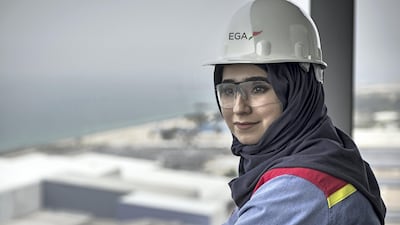Monitoring molten aluminium, analysing precise calculations and coping with fiery heat on a factory floor are not activities traditionally associated with conventional jobs for most women.
So when Emirati chemical engineer Shaikha Rashed Obaid Al Shehhi tells people about her job with the conglomerate Emirates Global Aluminium, she is usually met with surprise. “They ask me how I do this work. I tell them I love my job because it’s really very dynamic. It’s not like I only look at numbers on paper, I also feel it. When I see the equipment I know when there is a problem. I easily pick up any abnormality even sometimes without measurements,” said Ms Shehhi, a senior engineer who works at EGA sites in Jebel Ali and Al Taweelah.
Protected by a long coat, safety goggles, mask and helmet on the shop floor, Ms Shehhi monitors units where white powdery raw material is converted into silver liquid metal using electricity.
The temperature inside each unit is a blistering 960°C causing the heat to permeate across the factory floor where it can be as hot as 60°C.
“Each cell needs to be monitored. Since it is operating at 960°C if you are close, it’s very hot. But it’s very interesting to be in process control because we perform checks like a doctor. We check the temperature, pressure, drop in voltage measurement,” she said
“The temperature indicates if there is any problem with the process. If it goes beyond 970°C or to 940°C, we need to investigate. Measurements indicate how healthy and efficient our production is.”
Once the molten aluminium leaves Ms Shehhi’s section, it goes to the casting stage to be converted into a solid product. Ingots or blocks vary in weight from 20kg to 2,200kg, depending on customer requirements, and are used in electronic, aerospace applications, car wheels, window frames or aluminium foil.
Safety is critical, and the garments Ms Shehhi and others wear are specially designed to protect them from the heat and from rogue splashing.
_____________
Read more:
Emirati Women's Day: lawyer told women 'too emotional' for legal profession
Emirati Women's Day: mechanical engineer calls for change in male-dominated industries
Emirati Women's Day: Hire more women, say recruiters
_____________
She enjoys problem-solving and interacting with colleagues to take immediate action if the units are not operating to optimum capacity.
Working with a diverse team drawn from various countries has broadened her experience, she said.
Just like she gauges the machines, Ms Shehhi can tell from an engineer’s expression if he is on board with solutions suggested.
“I know from my team engineer’s face if he is happy or not convinced with the way we are working. This is what I have learnt the most: how to understand people and manage them in a better way,” said the 34-year-old.
She gained vital experience when she was moved to the Abu Dhabi operations in 2009 and watched the Al Taweelah site built from scratch.
Her manager Najeeba Al Jabri, vice president technical , has watched Ms Shehhi's growth.
“Shaikha is an inspiration for Emirati women who want to pursue an education in science and engineering. There are ample opportunities for Emiratis in Stem [science, technology, engineering, math] and it would be hard to find a more apt example of what can be accomplished than Shaikha.”
The first engineer in her family, Ms Shehhi always found the logic of science attractive. Her brothers work in the military, and she knew very early on that she would not follow her sisters in education and banking professions.
“I like facts and reality. Science and engineering is a logical way of thinking. Troubleshooting is basic for an engineer, to look at sourcing out the problem with the facts in hand,” she said.
After graduating with a chemical engineering degree from UAE University in Al Ain, she joined EGA in 2006.
Proud of her work ethic, she said she has yet to take a day off from work while studying for a two-year master’s degree from 7pm to 10pm.
Family is important and she commutes to work from Sharjah, where she lives with her sister’s family, and spends weekends with her mother and relatives in Ras Al Khaimah.
She was among 30 girls to study engineering at university but found out afterwards that few took jobs in the engineering sector.
A factor some Emirati girls find intimidating was moving from an all-girls school and college to a workplace dominated by men.
Emirati Women’s Day is important to show the women they are a vital part of the country’s progress., Ms Shehhi said.
“We feel appreciated by this special day. There is no Emirati Man’s Day so I’m really proud to have a day for us.”
While she hopes more women will choose to work in engineering, her advice to young girls is to choose their own career.
“They need to select what they want and not want their parents want. Yes, we must listen to our parents, but I think it’s our life and we need to understand what is our passion.
"My ambition is to see more ladies in this industry. We also need more Emirati men in our sector. But it must be selected by them, not by their parents. In their heart they need to be engineers.”


